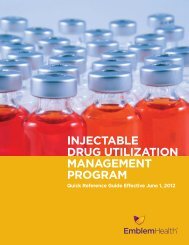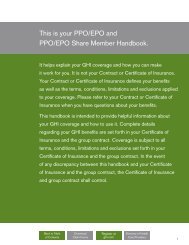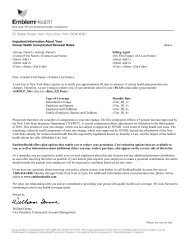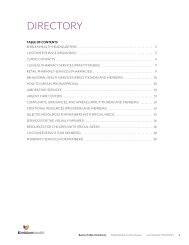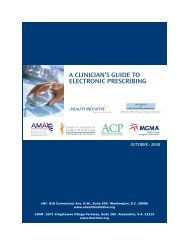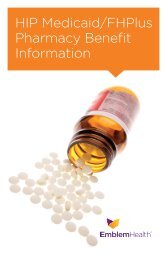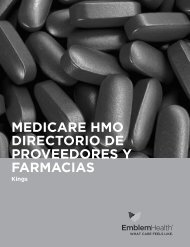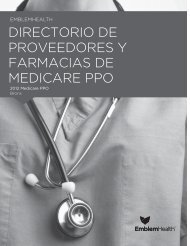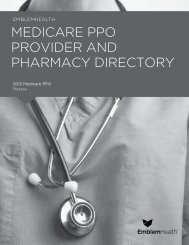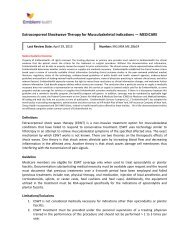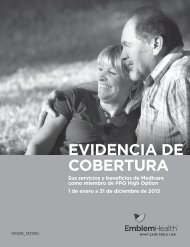PPO II - EmblemHealth
PPO II - EmblemHealth
PPO II - EmblemHealth
You also want an ePaper? Increase the reach of your titles
YUMPU automatically turns print PDFs into web optimized ePapers that Google loves.
212 2013 Evidence of Coverage for <strong>PPO</strong> <strong>II</strong><br />
Chapter 12: Defi nitions of important word<br />
In-Network Maximum Out-of-Pocket Amount – Th e most you will pay for covered Part A and Part B<br />
services received from network (preferred) providers. After you have reached this limit, you will not have<br />
to pay anything when you get covered services from network providers for the rest of the contract year.<br />
However, until you reach your combined out-of-pocket amount, you must continue to pay your share of<br />
the costs when you seek care from an out-of-network (non-preferred) provider. See Chapter 4, Section<br />
1.4 for information about your in-network maximum out-of-pocket amount.<br />
Late Enrollment Penalty – An amount added to your monthly premium for Medicare drug coverage<br />
if you go without creditable coverage (coverage that is expected to pay, on average, at least as much as<br />
standard Medicare prescription drug coverage) for a continuous period of 63 days or more. You pay this<br />
higher amount as long as you have a Medicare drug plan. Th ere are some exceptions. For example, if you<br />
receive Extra Help from Medicare to pay your prescription drug plan costs, the late enrollment penalty<br />
rules do not apply to you. If you receive Extra Help, you do not pay a penalty, even if you go without<br />
“creditable” prescription drug coverage.<br />
List of Covered Drugs (Formulary or “Drug List”) – A list of prescription drugs covered by the plan.<br />
Th e drugs on this list are selected by the plan with the help of doctors and pharmacists. Th e list includes<br />
both brand name and generic drugs.<br />
Low Income Subsidy (LIS) – See “Extra Help.”<br />
Medicaid (or Medical Assistance) – A joint Federal and state program that helps with medical costs for<br />
some people with low incomes and limited resources. Medicaid programs vary from state to state, but<br />
most health care costs are covered if you qualify for both Medicare and Medicaid. See Chapter 2, Section<br />
6 for information about how to contact Medicaid in your state.<br />
Medically Accepted Indication – A use of a drug that is either approved by the Food and Drug<br />
Administration or supported by certain reference books. See Chapter 5, Section 4 for more information<br />
about a medically accepted indication.<br />
Medically Necessary – Services, supplies, or drugs that are needed for the prevention, diagnosis, or<br />
treatment of your medical condition and meet accepted standards of medical practice.<br />
Medicare – Th e Federal health insurance program for people 65 years of age or older, some people<br />
under age 65 with certain disabilities, and people with End-Stage Renal Disease (generally those with<br />
permanent kidney failure who need dialysis or a kidney transplant). People with Medicare can get their<br />
Medicare health coverage through Original Medicare, a Medicare Cost Plan, a PACE plan or a Medicare<br />
Advantage Plan.<br />
Medicare Advantage Disenrollment Period – A set time each year when members in a Medicare<br />
Advantage plan can cancel their plan enrollment and switch to Original Medicare. Th e Medicare<br />
Advantage Disenrollment Period is from January 1 until February 14, 2013.<br />
Medicare Advantage (MA) Plan – Sometimes called Medicare Part C. A plan off ered by a private<br />
company that contracts with Medicare to provide you with all your Medicare Part A and Part B benefi ts.<br />
A Medicare Advantage Plan can be an HMO, <strong>PPO</strong>, a Private Fee-for-Service (PFFS) plan, or a Medicare<br />
Medical Savings Account (MSA) plan. When you are enrolled in a Medicare Advantage Plan, Medicare<br />
services are covered through the plan, and are not paid for under Original Medicare. In most cases,<br />
Medicare Advantage Plans also off er Medicare Part D (prescription drug coverage). Th ese plans are called<br />
Medicare Advantage Plans with Prescription Drug Coverage. Everyone who has Medicare Part A and



